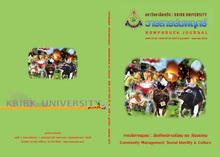บทบาทของรัฐ ทุน แรงงานในกระแสโลกาภิวัตน์ : กรณีศึกษา บันทึกความเข้าใจด้านแรงงานระหว่างเกาหลีใต้กับไทย
Main Article Content
Abstract
จากกรณีศึกษาการทำบันทึกความเข้าใจด้านแรงงานระหว่างเกาหลีใต้กับไทยนับเป็นตัวอย่างที่สะท้อนให้เห็นถึงข้อสรุปบทบาทความสัมพันธ์ระหว่างรัฐ ทุน และ แรงงานภายใต้กระแสแห่งทุนนิยมโลกาภิวัตน์ว่า รัฐมีแนวโน้มที่จะตอบสนองต่อทุนข้ามชาติและทุนท้องถิ่นมากกว่าจะให้ความสำคัญกับแรงงาน ส่วนแรงงานก็มีพลวัตร ของการเปลี่ยนแปลงไปในลักษณะที่มีการเคลื่อนย้ายทั้งในส่วนของการนำเข้า และส่งออก เพื่อรับใช้กลุ่มทุนข้ามชาติ โดยอยู่ภายใต้การควบคุมและกดทับจากรัฐและ ทุนมาโดยตลอด
The Role of State, Capitalist and Labour in Globalization : A Case Study of South Korea-Thailand MOU on Labor
In the era of globalization, State authority has been more frequently challenged by the pressures inside and outside the country. As a result, the state needs to adjust their power and authority to fit in the fast-paced changing world’s society. In this regard, the state requires the adaptation to accept the roles of other players, such as, international organizations, Multinational Corporation, private business organizations and non-government organizations (NGOs). These factors necessarily prompt the study on the state’s trend in term of shifting roles in globalization age which affects the entire units in society especially capitalist and labour.
Based on the case study of labour MOU signing between South Korea and Thailand, it reflects the overall scenario of relationship among state, capital and labour under the impact of globalization. Apparently, the state tends to patronize the overseas capitalists rather than put emphasis on labour. On the other hand, the labour has changed their dynamic role through their transfer as the import and export to serve the group of overseas capitalists under the control and suppression by state and capitalist most of the time.
Article Details
Every article published in the Romphruek Journal of the Humanities and Social Sciences is the opinion and point of view of the authors. Thery're not the viewpoint of Krirk University or the editored department. Any part or all of the articles for pablication must be clearly cited.

